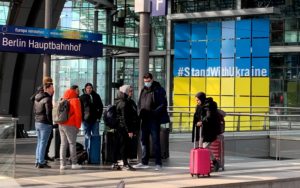


We have all watched in horror as the atrocities being carried out in Ukraine have overtaken our newsfeeds. Unfortunately, approximately 10 million Ukrainians have been displaced, and about four million have fled the country. The speed and scale of the Ukrainian exodus makes it the biggest and fastest displacement of people in Europe since World War II.
With millions of Ukrainians now in limbo, we’ve also been heartened by the staggering outpouring of global support being shown in so many ways, from donations of food, medicine, and supplies to the opening of private homes for the influx of refugees to simply flying the blue and yellow Ukrainian flag as a show of solidarity.
It is in moments like this that we are reminded of the collective power of good to overcome the disenfranchised and of the incredible impact of even the smallest gestures to shape the course of history.
That’s why I’m so humbled by the grassroots effort that has grown out of our Berlin office to support Ukrainian refugees. True to our values of being broad and flexible thinkers with a strong results orientation, our team alongside many other companies and volunteers in Berlin, sprung to action as soon as they saw the first images of Ukrainian refugees flooding Berlin Central Station. Gathering up SIM cards, gift cards and other small necessities that could reach a large amount of people, the team has organized regular trips to meet arriving trains and offer a helping hand in any way they can. While providing access to cell phone service in a foreign country or a few dollars to a family in need will not reverse the column of tanks that are destroying towns and cities throughout Ukraine, these tiny steps are helping people get by in a time of great stress. More importantly, they send the signal that we are all part of a much larger global community, one that will not stand back and watch as others struggle. I’d like to applaud the efforts of Berliners for their creativity and grit and celebrate the problem-solving spirit that keeps them going back to the train station each week.